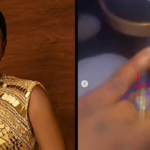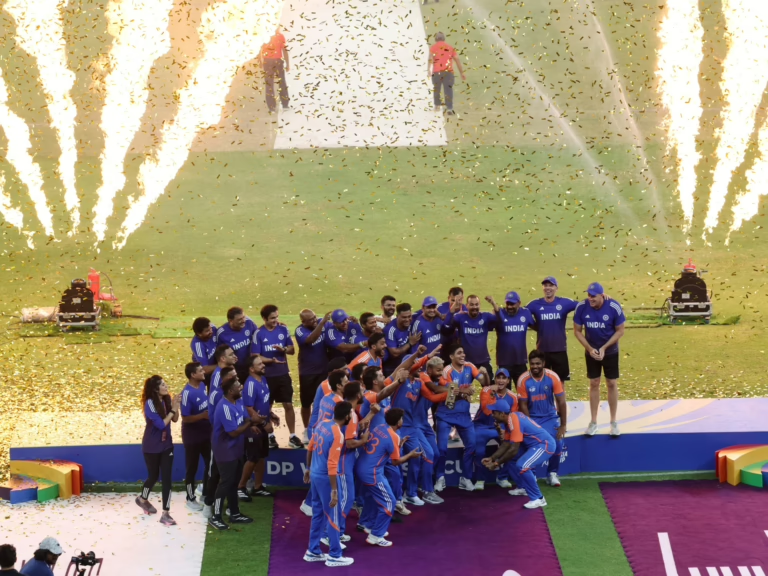On Sunday, the sporting world witnessed a dramatic escalation in India-Pakistan tensions when the Indian cricket team declined to accept the Asia Cup trophy after securing a five-wicket victory over Pakistan in the final held in Dubai.
This final marked the third encounter between the two cricketing rivals in the tournament, occurring just months after a brief but intense aerial conflict sparked by a deadly attack on tourists in Pahalgam, located in Indian-administered Kashmir, on April 22.
Reasons Behind India’s Refusal to Accept the Trophy
The Indian team’s refusal stemmed from the fact that the trophy was to be presented by Mohsin Naqvi, who holds dual roles as the president of the Asian Cricket Council (ACC) and chairman of the Pakistan Cricket Board (PCB).
In addition to these positions, Naqvi serves as Pakistan’s federal interior minister.
Devajit Saikia, chairman of the Board of Control for Cricket in India (BCCI), explained to India’s ANI news agency, “We have chosen not to receive the Asia Cup trophy from the ACC chairman, who is also a prominent political figure in Pakistan.”
He further added, “This decision does not imply that the trophy and medals will be taken away by him. It is unfortunate, and we expect the trophy and medals to be returned to India promptly.” This statement referred to the unusual events that unfolded following the match’s conclusion.
What Transpired During the India-Pakistan Asia Cup Final?
Although the match concluded around 10:30 pm local time (18:30 GMT), the award ceremony was postponed until nearly midnight (20:00 GMT). Broadcast footage showed Naqvi engaged in discussions with match officials.
Before the trophy presentation commenced, an official unexpectedly removed the Asia Cup champions trophy from the stage without providing any explanation.
Individual awards were handed to Indian players Kuldeep Yadav, Abhishek Sharma, and Tilak Varma by other dignitaries present. Despite Naqvi’s presence on stage, the Indian players deliberately avoided acknowledging him, and he reciprocated by not applauding them.
Pakistani captain Salman Agha accepted the runners-up prize from Naqvi.
Simon Doull, a former New Zealand cricketer who hosted the post-match ceremony, announced, “The Asian Cricket Council has informed me that the Indian cricket team will not be collecting their awards tonight.” He then concluded the presentation.
In response, the Indian team celebrated by mimicking holding the trophy, despite not receiving it physically.
While the trophy’s whereabouts remain unconfirmed, it is typically held by the tournament organizers until officially handed over to the champions. As of late Sunday, the Indian team had yet to receive it.
Indian captain Suryakumar Yadav expressed his disappointment during the post-match press conference: “In all my years following and playing cricket, I have never witnessed a champion team being denied their trophy, especially one earned through hard work. We deserved it, and that sums up my feelings.”
Yadav emphasized that the decision to reject the trophy was made collectively by the team, stating, “No one instructed us to do this.”
Background and Political Context
Relations between India and Pakistan have long been strained, deteriorating sharply after the April 22 attack in Pahalgam, where gunmen killed 26 people at a popular tourist destination in Indian-administered Kashmir.
The Resistance Front (TRF), a militant group advocating for Kashmir’s independence, claimed responsibility. India accuses TRF of being an offshoot of the Pakistan-based Lashkar-e-Taiba (LeT), a claim Pakistan denies.
Following the attack, diplomatic ties between the two nations were downgraded, and India suspended its participation in the Indus Waters Treaty.
On May 7, India launched missile strikes on multiple locations in Pakistan and Pakistan-administered Kashmir under “Operation Sindoor,” targeting nine sites according to Indian sources, with Pakistan reporting civilian casualties.
Pakistan retaliated on May 10 with “Operation Bunyan Marsoos,” striking at least six Indian military installations and reportedly killing five Indian personnel.
Later that day, a ceasefire agreement was brokered and announced by then-US President Donald Trump.
Escalation of Cricketing Rivalry
The tensions witnessed during Sunday’s match were the culmination of mounting strain throughout the Asia Cup.
Within India, numerous politicians and public figures, including supporters of Prime Minister Narendra Modi’s Hindu nationalist Bharatiya Janata Party, urged the national team to boycott matches against Pakistan.
Pro-government media outlets criticized the BCCI for participating in the Asia Cup alongside Pakistan. The BCCI clarified that it was adhering to government directives, which prohibit bilateral series with Pakistan but allow participation in multi-nation tournaments where India may face Pakistan.
India not only competed but faced Pakistan in three matches, winning all. However, Indian players refrained from shaking hands with their Pakistani counterparts, a gesture that drew criticism from Pakistan.
After the first match on September 14, Indian captain Yadav dedicated the victory to the Indian armed forces and the victims of the Pahalgam attack, stating, “We stand with the families affected by the Pahalgam terror attack and salute the bravery of our armed forces.”
Pakistani fast bowler Haris Rauf responded to jeers from Indian fans by making a 6-0 hand gesture and mimicking an aircraft being shot down, referencing Pakistan’s claim of downing six Indian jets during the May conflict. India acknowledged that some of its aircraft were lost.
Following the second match on September 21, Pakistani batsman Sahibzada Farhan celebrated reaching 50 runs by mimicking firing a machine gun with his bat, a move that upset many Indian supporters given the context of the Pahalgam attack, where attackers targeted non-Muslims.
In the final match on Sunday, Farhan again reached 50 runs but chose to celebrate quietly.
India also questioned Naqvi’s conduct during the tournament. Despite his role as ACC president, expected to be impartial, his position as PCB chairman and Pakistani minister raised concerns. After India’s refusal to shake hands post-first match, Naqvi posted on X (formerly Twitter), “It is disappointing to witness poor sportsmanship. Mixing politics with sport undermines the spirit of the game. Let us hope future victories are celebrated with dignity.”
On September 15, Naqvi posted, “Nothing is more important to me than the honor and prestige of my country,” accompanied by the Pakistani flag emoji.
Reactions from Indian and Pakistani Leaders
Indian Prime Minister Narendra Modi tweeted after the final, “#OperationSindoor on the cricket field. The result is the same – India triumphs! Congratulations to our cricketers.”
Naqvi responded by quoting Modi’s post, stating, “If war defines your pride, history records your defeats at Pakistan’s hands. No cricket match can change that reality. Bringing war into sport only reveals desperation and tarnishes the game’s spirit.”
Cricket as a Diplomatic Bridge
Historically, cricket has served as a channel for diplomacy between India and Pakistan, helping to ease tensions and foster dialogue.
The concept of “cricket diplomacy” gained prominence under Pakistan’s President Mohammad Zia-ul-Haq, who ruled from 1978 to 1988.
In February 1987, Zia-ul-Haq visited India to watch a test match amid heightened Kashmir tensions, with Indian troops amassed along the disputed border.
In 1999, India hosted Pakistan for their first bilateral test series in a decade, just months after both nations conducted nuclear tests. Following Pakistan’s narrow victory in Chennai, Pakistani players received a standing ovation from Indian fans, highlighting cricket’s role in diplomacy.
Between 2003 and 2008, cricket diplomacy flourished, with reciprocal test series hosted by both countries. In April 2005, Pakistani President Pervez Musharraf attended talks with Indian Prime Minister Manmohan Singh and watched a cricket match together.
In March 2011, Singh invited Pakistani Prime Minister Yousuf Raza Gilani to watch the World Cup semifinal between the two nations, which Gilani accepted.
Was India’s Trophy Rejection Anticipated?
Experts suggest that Sunday’s developments were foreseeable, given that Naqvi was designated to present the winner’s trophy.
India’s response was also predictable in light of the ongoing political climate.
“While the ideal is to separate politics from sports, the reality is far more complex,” explained Mathew John Moolakkattu, a researcher specializing in cricket diplomacy at Amrita Vishwa Vidyapeetham University in Coimbatore, India.
“Considering the strained relations, it was almost inevitable that these tensions would manifest in cricket, a shared passion for both countries.”
Moolakkattu noted that Indian captain Yadav had pledged to donate his entire match fee to the Indian Army, underscoring the team’s stance.
“The Indian team made it clear they were proud to win but would not accept the trophy from Naqvi due to unresolved political issues,” he said.
This position reflects India’s broader strategy to distance itself from Pakistan across diplomatic, economic, and sporting arenas until it perceives concrete actions against alleged support for terrorism. Pakistan denies these allegations.
Nonetheless, Moolakkattu remarked that the manner in which the Asia Cup concluded “diminishes any positive diplomatic momentum the tournament might have generated.”

















